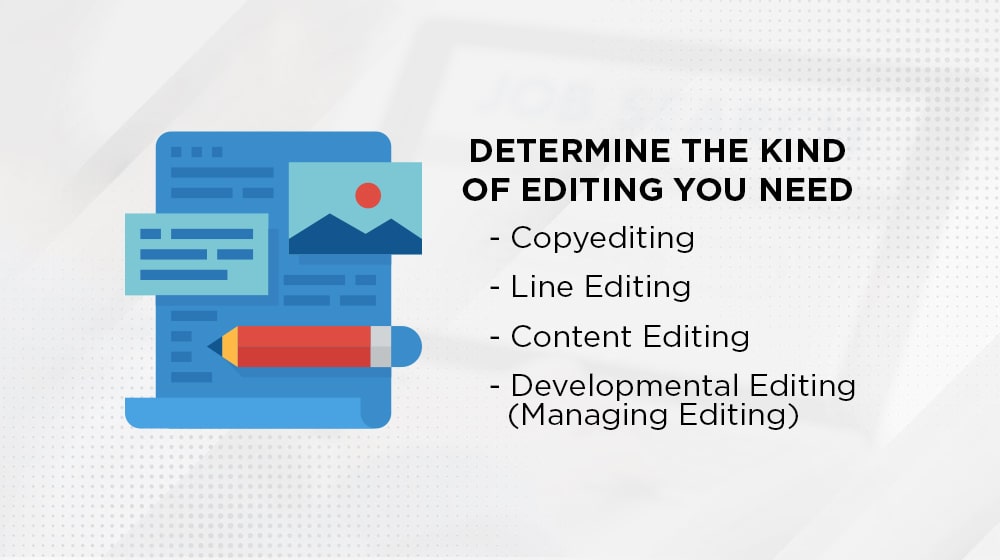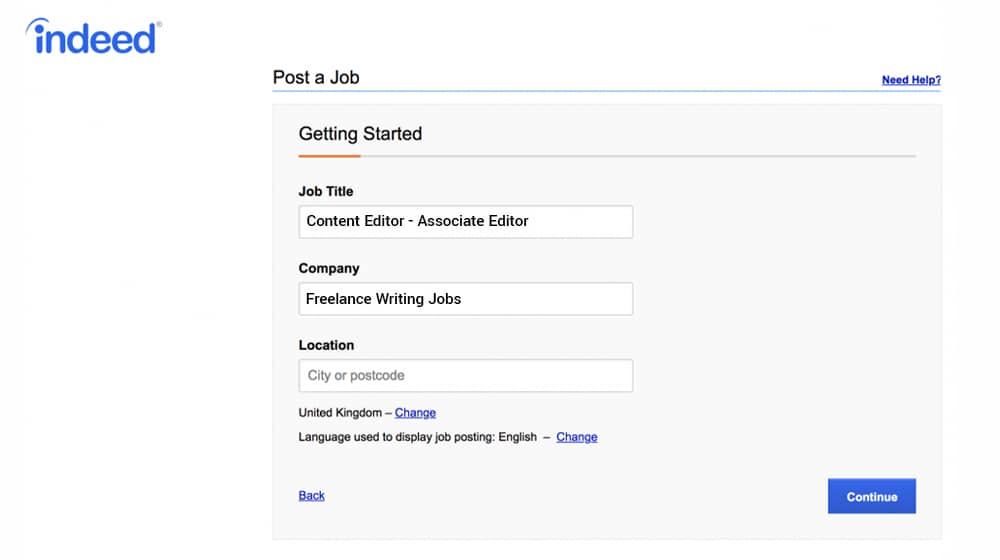What type of editor are you looking for?
Editors are an important part of any workflow that involves creating content for publication. Yes, that includes everything from books to landing pages to blog posts to newsletters. They play a critical role, which is to ensure that the content you're publishing is the best it can possibly be. They pay attention to high-level concerns about overall content style, brand voice, factual accuracy, and of course, the basics of grammar and language usage.
At the same time, there are different kinds of editors and editors that play different roles in a content marketing team. Some editors may be little more than a second set of eyes to review each piece of content for grammatical accuracy; others may be akin to content directors and strategists. There's a world of difference between a copyeditor and a managing editor.
So, how can you hire an editor? Here's a process you can follow.
The first choice you need to make is deciding on the kind of editing you want out of your editor. The term "editor" is very broad and encompasses a bunch of different kinds of editing, and an editor who specializes in one kind won't be very effective at another or won't want to do the work because it's beneath their expertise level.

Copyediting or technical editing is the simplest kind of editing. These editors go through a piece and look for spelling, grammar, and other technical issues with the writing itself. They'll read a piece and look for instances where a writer got distracted partway through a sentence and ended it abruptly, or cases where they inserted an extra word, or even just opportunities to streamline the writing. Oftentimes, copyediting will also look at your pieces and ensure that they adhere to your style guide or brand style rules, such as in how you refer to your company, what point of view and perspective the writing uses, and so on.
Copyediting can also be referred to as proofreading or polishing, particularly if it's taking place as a final pass before publication.
While copyediting and line editing are very similar, line editing is technically a bit more involved. Line editing involves everything that copyediting does, but it also looks for things like the structure of a piece, the flow of ideas from A to B to C, the logical consistency of the arguments, and other potential creative or content issues. Line editors, for this reason, need to be much more familiar with your subject, with your business, and with the perspectives and arguments you want to make as your brand.
Line editing is most common in first drafts, with copyediting coming in as a final polish before publication. As such, one editor can often do both if they're skilled with line editing, but a copyeditor may struggle with the higher-level inspection when they're used to word-level issues.
 Note: depending on who you talk to, copyediting and line editing may be switched. Different people and different groups (like educational institutions and online certificate programs) may use different definitions. This is why it's important to be clear about your needs and expectations.
Note: depending on who you talk to, copyediting and line editing may be switched. Different people and different groups (like educational institutions and online certificate programs) may use different definitions. This is why it's important to be clear about your needs and expectations.Content editing is focused more on high-level issues, like line editing, but may be more involved in the process. Sometimes, content editors review content in the outline phase, even before the actual content is written.
Content editing dives deep into the logic, arguments, data sources, and conclusions that are made in a piece of writing. They're responsible for trimming the fat and fluff, they ensure that the data you cite actually supports your conclusions, and they can even fact-check content for you. Because of this, they typically need to be at least moderately experienced in your niche, if not subject matter experts.
At the highest level, developmental editors are more akin to blog managers than they are copyeditors. While they can do copyediting, it's not their primary concern. They're more interested in things like how well your new content fits in with your old content, what kinds of content you should and shouldn't publish, and even more technical aspects like SEO. This is the "managing editor" role for major publications, the people who serve as content strategists and gatekeepers for what can and can't be published on a site.
Picking the kind of editing you need should generally start at the highest possible level. Higher-tiered editors can perform the duties of lower-tier editors, but lower-tier editors may struggle with the inverse.
Once you know what kind of editing you want out of your editors, it can be a good idea to develop a test for them. An editing test should generally involve a piece of content that you would consider publishing and that needs polishing.

You can intentionally insert errors and issues into it, assign each issue a score, and judge your editors based on how many of those issues they find and how comprehensive they are with their editing.
As with hiring writers, you want to pay for your test. Unlike with hiring writers, you won't likely be able to use the content afterward since you are presumably using the same test for many different potential editors. Either way, you want something as close to the real job the editor would be doing as possible to see how they would perform.
Another choice to make is whether you want to hire editors as freelancers or hire them as employees. There are pros and cons to both methods.
Freelance editors often have more flexibility. You can pay them lower rates (since you don't have to worry about benefits, and they likely have multiple clients), and you can have a variable workload for them depending on your needs. On the other hand, they can drop you as a client with relatively little notice for a variety of reasons, and it may be hard to find good, consistent editors for higher-level roles in the freelance market. Many of the more managing editor tier like the stability of a constant employer instead of the freelance grind.

Hiring editors as employees gives them a greater opportunity to build familiarity with you, your industry, your niche, and your business. The longer and more consistently you work with them, the better they'll be at their job. On the other hand, they can be more expensive, and a salary is stable regardless of your workload.
Remember, too, that freelance editors may prefer to work on different kinds of payment plans. Some will work per word of edited content. This may be on an actual per word rate or a per page rate with a standard definition for how many words constitutes a page. Others may work per project, with a rate sheet for different kinds of projects. Still others may prefer to invoice you on a per hour basis, so they are compensated more for work that ends up needing more effort or is more complex. And, of course, employee editors would work on an hourly or salaried basis, depending.
Once you've laid all of the groundwork, it's time to find editor candidates. You have two options here, just like with writers: you can go out and find them, or you can post a job opportunity and let them come to you.
Posting a job opportunity is pretty standard. Write a job listing, put it on your careers page, and post it on sites like LinkedIn, Indeed, and FlexJobs. You'll have applications flooding in before too long, and you'll have your pick of the candidates.

Looking for editor candidates on your own is a bit different. You can go to sites like Upwork to find them, just like with writers and other professionals. You can also look for their personal websites if they have them, though this can be tricky as editors usually operate via word-of-mouth recommendations.
Some editor-specific options are to visit the Editorial Freelancers Association to find freelancers through their member directory and to search social media (in particular Twitter, though we'll see if that holds true post-Musk) to look for editors posting about needing work.
Finally, you can approach publications similar to yours and ask them if they have an editor, and if so, who. You may be able to work with their freelancer, someone they know, or someone their freelancer knows. Alternatively, you can even try to poach the editors from existing publications, though you often need a significant offer to do so successfully.
Once you've built up a list of editor candidates, you'll be tasked with interviewing and testing them.
Before you get too far, you might also consider whether or not you want to hire more than one editor. For example, you might hire both a managing editor to guide your overall content production and a copyeditor to smooth out and polish content before it's actually published. Along with a graphic designer, a writer, and someone to handle publishing and SEO, you have a fairly robust content marketing team right there.

What should you pay attention to in your interview?
The test is essential as well. While you don't need to make a fully-scored rubric like mentioned above, you still want something that can evaluate the actual work the editor can do. Give the test to people who pass at least an initial review and interview.
Once you have narrowed down your field to a good candidate or two, it's time to pick one and hire them. We're glossing over a lot of little details about negotiating pay rates, considering the volume of work, evaluating consistency, and other factors here, but it's all par for the course with hiring someone.
Just like with writers, you generally want a contract to work with your editors. They may have one they use for all of their clients, or they may expect you to have one. Either way, make sure you both read through and agree to the terms outlined in the contract and sign it.

When working with an editor, one thing you may consider is making a list of the feedback they give and keeping an eye out for trends. If there's one common issue they point out consistently, you can save everyone time and hassle by internalizing the feedback and avoiding making the mistake again. Learning to be better is the real reason to hire an editor, after all.
Are you looking to hire an editor, a writer, or anyone else for your content team? If so, you've come to the right place. Check out my other guides on hiring professionals for your content marketing and my job board to find the people who will make it shine.